Research 2005
 Improving Industrial Policy Formulation (2nd printing)
(Jul.2005)--VDF just issued the second
Improving Industrial Policy Formulation (2nd printing)
(Jul.2005)--VDF just issued the second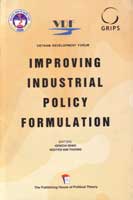 printing of Improving
Industrial Policy Formulation (Hoan thien chien luoc phat trien cong
nghiep Viet Nam) edited by Prof. Nguyen Van Thuong (Rector, National
Economics University) and myself and published by the Publishing House of
Political Theory in Hanoi. The book is available in English and
Vietnamese. The first printing in March 2005 has been all distributed. The
second printing improves text and figure style but the content remains the
same as the first.
printing of Improving
Industrial Policy Formulation (Hoan thien chien luoc phat trien cong
nghiep Viet Nam) edited by Prof. Nguyen Van Thuong (Rector, National
Economics University) and myself and published by the Publishing House of
Political Theory in Hanoi. The book is available in English and
Vietnamese. The first printing in March 2005 has been all distributed. The
second printing improves text and figure style but the content remains the
same as the first.
This book is a collection of VDF industry research in 2004. It proposes
the renewal of Vietnam's industrial policy methodology from planning and
numerical targets to competitiveness and positioning strategies in the
dynamic context of East Asia. It studies several key industrial sectors in
depth including motorbike, automobile, electronics and "supporting
industries." All of the papers in this volume were presented to policy
makers (including Minister of Industry HE Hoang Trung Hai) at various
symposiums and workshops.
 The First VDF Tokyo
Conference on the Development of Vietnam (Jun.18, 2005)--This
conference was held at GRIPS and attended by 47 people. The following
presentations were made:
The First VDF Tokyo
Conference on the Development of Vietnam (Jun.18, 2005)--This
conference was held at GRIPS and attended by 47 people. The following
presentations were made:
Prof. Kenichi Ohno (GRIPS; from copycats to quality)
Prof. Masaya Shiraishi (Waseda; Mekong Region cooperation)
Pham Thai Binh (IUJ; money demand)
Le Viet Anh (Nagoya Univ; FDI & growth)
Tadashi Kikuchi (Keio Univ; Gini inequality)
Pham Vu Thang (U of E. Anglia; garment industry)
In addition, "one-page presentations" by 20 researchers from all over the
world were displayed. After the conference, an informal exchange was held
at a nearby restaurant.
more

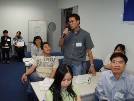
 |
|
Mission visits Honda |
 Vietnam's Ministry of
Industry (MOI) visits Tokyo (May/Jun. 2005)--GRIPS/VDF
invited Mr. Le Van Duoc (Director) and Mr. Cao Xuan Thanh (Deputy
Director), Planning Department of Vietnam's MOI, to Japan. The purpose of
their mission was to study and exchange views on industrial policy
formulation methodology and government-private sector linkage for a
latecomer country under globalization. They presented their policy concern
at a GRIPS workshop on May 30. They visited METI (3 meetings), JBIC,
JETRO, RIETI, DBJ, Tokyo Univ., Waseda Univ. and Honda. This mission was
part of GRIPS' Center of Excellence Project funded by Monbukagakusho.
mission report
Vietnam's Ministry of
Industry (MOI) visits Tokyo (May/Jun. 2005)--GRIPS/VDF
invited Mr. Le Van Duoc (Director) and Mr. Cao Xuan Thanh (Deputy
Director), Planning Department of Vietnam's MOI, to Japan. The purpose of
their mission was to study and exchange views on industrial policy
formulation methodology and government-private sector linkage for a
latecomer country under globalization. They presented their policy concern
at a GRIPS workshop on May 30. They visited METI (3 meetings), JBIC,
JETRO, RIETI, DBJ, Tokyo Univ., Waseda Univ. and Honda. This mission was
part of GRIPS' Center of Excellence Project funded by Monbukagakusho.
mission report
 McKinnon on China's foreign exchange (May 2005)--The
May 26 issue of The Shanghai Securities News published Prof.
McKinnon's essay on "Limited Foreign Exchange Flexibility for China: A Two
Percent Solution?" Prof. McKinnon argues that China must now do two
things: (1) execute capital account liberalization carefully with proper
regulation on foreign exchange exposure and foreign currency borrowings in
order to avoid Asian Crisis-like shocks; and (2) introduce a Bretton
Woods-like two percent band around the current central rate of 8.28. He
wants China to go slowly rather than yielding to the American pressure to
devalue the yuan or lift capital control too quickly.
full draft (may be a bit
different from actually published version)
McKinnon on China's foreign exchange (May 2005)--The
May 26 issue of The Shanghai Securities News published Prof.
McKinnon's essay on "Limited Foreign Exchange Flexibility for China: A Two
Percent Solution?" Prof. McKinnon argues that China must now do two
things: (1) execute capital account liberalization carefully with proper
regulation on foreign exchange exposure and foreign currency borrowings in
order to avoid Asian Crisis-like shocks; and (2) introduce a Bretton
Woods-like two percent band around the current central rate of 8.28. He
wants China to go slowly rather than yielding to the American pressure to
devalue the yuan or lift capital control too quickly.
full draft (may be a bit
different from actually published version)
 VDF Conference in media (May 2005)--The May 6
issue of Thoi bao Kinh te Viet Nam (Vietnam Economic Times) carried
a 2-page article on the VDF conference o
VDF Conference in media (May 2005)--The May 6
issue of Thoi bao Kinh te Viet Nam (Vietnam Economic Times) carried
a 2-page article on the VDF conference o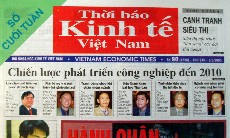 n
industrial strategy in March 2005. Keynote speeches by Hoang Trung Hai
(Minister of Industry) and myself were featured. The views of four other
Vietnamese and Japanese experts were also introduced. In my speech, I
compared industrial policy formulation between Vietnam and Thailand. Both
countries aim to industrialize under global and regional integration, but
the Thai approach is more open and linked more closely to the private
sector partly due to its higher income and longer history of FDI-led
growth. The Thai automobile master plan is much more detailed in action
plans while the Vietnamese automobile master plan is more detailed in
production and export targets by type of vehicle. With proper
modifications, Vietnam can learn much from Thailand, a country that goes
ahead of Vietnam in globalization and market orientation. Thailand has
also weaknesses, namely inability to develop supporting industries and
human resources even after four decades of industrialization. We must
learn from their mistakes too. The VDF-MOI Thai mission in Feb.-Mar. 2005
was behind these conclusions.
mission report
my slides
n
industrial strategy in March 2005. Keynote speeches by Hoang Trung Hai
(Minister of Industry) and myself were featured. The views of four other
Vietnamese and Japanese experts were also introduced. In my speech, I
compared industrial policy formulation between Vietnam and Thailand. Both
countries aim to industrialize under global and regional integration, but
the Thai approach is more open and linked more closely to the private
sector partly due to its higher income and longer history of FDI-led
growth. The Thai automobile master plan is much more detailed in action
plans while the Vietnamese automobile master plan is more detailed in
production and export targets by type of vehicle. With proper
modifications, Vietnam can learn much from Thailand, a country that goes
ahead of Vietnam in globalization and market orientation. Thailand has
also weaknesses, namely inability to develop supporting industries and
human resources even after four decades of industrialization. We must
learn from their mistakes too. The VDF-MOI Thai mission in Feb.-Mar. 2005
was behind these conclusions.
mission report
my slides
 With Hanoi People's
Committee
(May 2005)--Recently I had an informal discussion
with the Science & Technology Dept. of Hanoi People's Committee (municipal
government).
With Hanoi People's
Committee
(May 2005)--Recently I had an informal discussion
with the Science & Technology Dept. of Hanoi People's Committee (municipal
government).
HPC: We want VDF to help draft a master plan to develop Hanoi
faster. We want to target IT, electronics, biotech, etc but we need
scientific proof that these are the right choices.
Ohno: I know Hanoi has the list of "preferred" industries but they
are not effective. How about abolishing the list? Why don't you let
enterprises decide sectors? Government should clarify its development
vision and support private activities, but it should not micromanage
investment choices.
HPC: Hmmm. We never thought about this, but maybe you can proceed
that way.
Ohno: You must differentiate and position yourself. I suggest that
Hanoi declare to become a Free Economic Zone with strong FDI marketing and
quick response to businesses. This should send a good signal to potential
investors. You must also solve problems associated with growth like
traffic, environment, labor mobility, housing, land price inflation, etc.
That should be the main contents of the master plan.
HPC: Is there a good methodology to do all this?
Ohno: You don't need any math or econometric model. Professors and
officials are no good at concrete strategy making, so you must listen to
businesses. When VDF studies industries, our only methodology is to listen
to businesses a lot and find out real problems. Our role is to summarize
and present their ideas effectively, not to provide abstract theories.
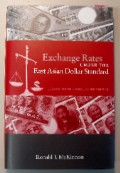
 McKinnon's new book
(Apr.2005)--Prof. Ronald I. McKinnon, my former
academic advisor at Stanford University, just published a book,
Exchange Rates under the East Asian Dollar Standard: Living with
Conflicted Virtues, MIT Press, 2005. His main ideas include (i) the
desirability of keeping the dollar as the key currency in East Asia
(rather than installing a new currency basket); (ii) analysis of political
pressure to appreciate the currency of emerging surplus country
(previously Japan, now China); and (iii) the problem of a surplus country
which accumulates a huge amount of external assets denominated in someone
else's currency (typically dollar) and therefore faces enormous exchange
risks. I will introduce some of his ideas in my lectures.
McKinnon's new book
(Apr.2005)--Prof. Ronald I. McKinnon, my former
academic advisor at Stanford University, just published a book,
Exchange Rates under the East Asian Dollar Standard: Living with
Conflicted Virtues, MIT Press, 2005. His main ideas include (i) the
desirability of keeping the dollar as the key currency in East Asia
(rather than installing a new currency basket); (ii) analysis of political
pressure to appreciate the currency of emerging surplus country
(previously Japan, now China); and (iii) the problem of a surplus country
which accumulates a huge amount of external assets denominated in someone
else's currency (typically dollar) and therefore faces enormous exchange
risks. I will introduce some of his ideas in my lectures.
 About GDF
(Apr.2005)--The GRIPS Development Forum (GDF),
established in early 2002, is a research unit in GRIPS specializing in
development and aid policies. We aim at practical and realistic advice and
policy impact. I am one of the founding professors. The GDF office is
located on the fourth floor of new GRIPS. We work intensively with the
Japanese government to help formulate its ODA policy. We also work on
specific issues including aid modality difference between East Asia and
Africa, reassessing the role of large-scale infrastructure in development
design, drafting Japan's ODA strategies for Vietnam (2004) and Ghana
(ongoing), cooperating with ODI (British aid think tank), and running VDF
(see below).
About GDF
(Apr.2005)--The GRIPS Development Forum (GDF),
established in early 2002, is a research unit in GRIPS specializing in
development and aid policies. We aim at practical and realistic advice and
policy impact. I am one of the founding professors. The GDF office is
located on the fourth floor of new GRIPS. We work intensively with the
Japanese government to help formulate its ODA policy. We also work on
specific issues including aid modality difference between East Asia and
Africa, reassessing the role of large-scale infrastructure in development
design, drafting Japan's ODA strategies for Vietnam (2004) and Ghana
(ongoing), cooperating with ODI (British aid think tank), and running VDF
(see below).
 About VDF
(Apr.2005)--The Vietnam Development Forum (VDF) is
one component of the GRIPS "Center of Excellence" (COE) research project
(2003-2008) funded by Monbu Kagakusho (MEXT). The project aims at
improving Vietnam's development policy through extensive networking and
mobilization of young local talents. In March 2005, we organized a
research mission to Thailand jointly with the Vietnamese Ministry of
Industry and hosted a conference on industrial policy formulation in Hanoi
where Mr. Hoang Trung Hai (Minister of Industry) and myself were the main
speakers. For more, see VDF web.
Since I am the leader of VDF on the Japanese side, I must frequently be in
Hanoi where VDF's main office is located. I ask for your understanding if
I am not always available in Tokyo. VDF also has a
Tokyo branch
within GDF.
About VDF
(Apr.2005)--The Vietnam Development Forum (VDF) is
one component of the GRIPS "Center of Excellence" (COE) research project
(2003-2008) funded by Monbu Kagakusho (MEXT). The project aims at
improving Vietnam's development policy through extensive networking and
mobilization of young local talents. In March 2005, we organized a
research mission to Thailand jointly with the Vietnamese Ministry of
Industry and hosted a conference on industrial policy formulation in Hanoi
where Mr. Hoang Trung Hai (Minister of Industry) and myself were the main
speakers. For more, see VDF web.
Since I am the leader of VDF on the Japanese side, I must frequently be in
Hanoi where VDF's main office is located. I ask for your understanding if
I am not always available in Tokyo. VDF also has a
Tokyo branch
within GDF.

 Japanese book on Japan (Apr.2005)--In Feb.
2005 I published a Japanese book, Tojokoku Nippon no Ayumi: Edo kara
Heisei madeno Keizai Hatten (The Path Traveled by Japan as a
Developing Country: Economic Growth from Edo to Heisei) from Yuhikaku
(2,300 yen + tax). This book is actually a Japanese translation of my English
lecture, Economic Development of Japan, offered to GRIPS students
from 1998 to 2003. Unfortunately, this course is no longer offered despite
my wish. But if you are interested, you can read the contents in English
(85% same as the Japanese version) in this web.
Japanese book on Japan (Apr.2005)--In Feb.
2005 I published a Japanese book, Tojokoku Nippon no Ayumi: Edo kara
Heisei madeno Keizai Hatten (The Path Traveled by Japan as a
Developing Country: Economic Growth from Edo to Heisei) from Yuhikaku
(2,300 yen + tax). This book is actually a Japanese translation of my English
lecture, Economic Development of Japan, offered to GRIPS students
from 1998 to 2003. Unfortunately, this course is no longer offered despite
my wish. But if you are interested, you can read the contents in English
(85% same as the Japanese version) in this web.
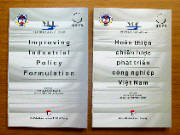
 English and Vietnamese book on industrial strategy
(Apr.2005)--VDF just printed a preliminary version of Improving
Industrial Policy Formulation (Hoan thien chien luoc phat trien cong
nghiep Viet Nam) edited by Prof. Nguyen Van Thuong (Rector, National
Economics University) and myself, and published by Publishing House of
Political Theory, Hanoi. This volume contains nine selected papers VDF
produced in its first year (2004-05). It proposes the concrete method for
designing industrial strategy in a developing country like Vietnam facing
rapid international integration, analyzes specific sectors like
electronics, motorbike and automobile, and specific issues like supporting
industry promotion and optimum parts procurement pattern. The book is
available in two languages. We are printing them more formally now, but if
you desperately want to read the preliminary versions, I have some spare
copies. All chapters are also downloadable from
VDF web.
English and Vietnamese book on industrial strategy
(Apr.2005)--VDF just printed a preliminary version of Improving
Industrial Policy Formulation (Hoan thien chien luoc phat trien cong
nghiep Viet Nam) edited by Prof. Nguyen Van Thuong (Rector, National
Economics University) and myself, and published by Publishing House of
Political Theory, Hanoi. This volume contains nine selected papers VDF
produced in its first year (2004-05). It proposes the concrete method for
designing industrial strategy in a developing country like Vietnam facing
rapid international integration, analyzes specific sectors like
electronics, motorbike and automobile, and specific issues like supporting
industry promotion and optimum parts procurement pattern. The book is
available in two languages. We are printing them more formally now, but if
you desperately want to read the preliminary versions, I have some spare
copies. All chapters are also downloadable from
VDF web.
 printing of Improving
Industrial Policy Formulation (Hoan thien chien luoc phat trien cong
nghiep Viet Nam) edited by Prof. Nguyen Van Thuong (Rector, National
Economics University) and myself and published by the Publishing House of
Political Theory in Hanoi. The book is available in English and
Vietnamese. The first printing in March 2005 has been all distributed. The
second printing improves text and figure style but the content remains the
same as the first.
printing of Improving
Industrial Policy Formulation (Hoan thien chien luoc phat trien cong
nghiep Viet Nam) edited by Prof. Nguyen Van Thuong (Rector, National
Economics University) and myself and published by the Publishing House of
Political Theory in Hanoi. The book is available in English and
Vietnamese. The first printing in March 2005 has been all distributed. The
second printing improves text and figure style but the content remains the
same as the first.